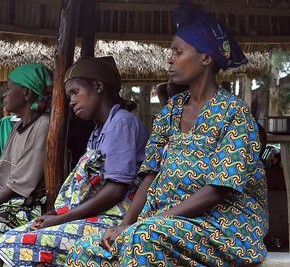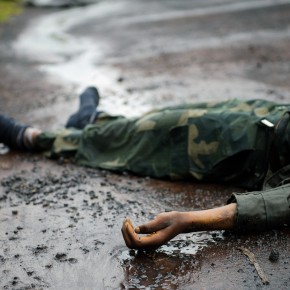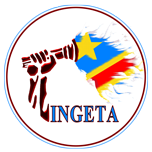By James Verini. Source: Foreign Policy.
How did 1,000 skinny militiamen in rubber boots conquer a city of 1 million people in a matter of hours?
GOMA, Democratic Republic of the Congo — After three days of sporadic fighting in and around Goma, the capital of North Kivu province in the Democratic Republic of Congo, the city fell to the M23 rebel movement last Monday night, November 19. The following Thursday morning, the military spokesman of the M23, Col. Vianney Kazarama, was standing at an intersection in central Goma, addressing a group of young men. Government troops were said to be in the hills planning a counteroffensive, and United Nations peacekeepers, who had attacked the M23 forces with helicopter gunships before fleeing, were nearby, awaiting new orders. Kazarama didn’t care, he said. He was thinking ahead. The M23 was going to create a better future not just for Goma but for all of Congo, he told the young men, and it needed their help.
« We have to go to Bukavu! » said Kazarama, referring to the capital of South Kivu province, some 60 miles south, and the presumed next step in the M23’s march, « and on to Kinshasa! » Kinshasa, the country’s capital, is a rather more ambitious goal, lying some 1,000 miles west across a dense mass of jungle. Kazarama then repeated what has become his favorite refrain since his group burst onto the world stage last week, calling on the president of Congo to step down. « Joseph Kabila must leave the country! » he said. Then he promised the young men that the M23, which officially formed in April, would provide them all with jobs.
Some cheered. Others looked on skeptically. As he left, Kazarama, a tall man in forest camouflage, spotted my notebook and shook my hand. « Bonjour, ca va, ca va, » he said in his choppy French. He got into a waiting SUV, and the spectators who’d followed him gathered around me. Like M23, they badly wanted to be heard. They were smart, articulate, and, for the most part, they told me, unemployed.
« If they have this mission, all Congolese must be behind them, because what the colonel is saying is true, » one young man said. « People are suffering. We are living without food. We are ready to fight to Kinshasa. »
A street vendor pushed his way through the crowd and lifted up a clutch of fake leather belts that he sells. « The president wants me to pay a surtax on these, » he said. « What kind of life are we leading? Tell him to quit his job and leave the population alone. »
At the sound of Kabila’s name, someone shouted « mwongo sana » — « big liar » in Swahili. Then « mwizi sana » — big thief.
After it was clear that Kazarama had gone, however, two men made their way up to me. « May we speak with you? We do not support the M23, » they said in unison. I asked why. « I don’t know what motive they’re supporting, » one said, voicing the common belief in Congo and elsewhere that the neighboring Rwandan and Ugandan governments are managing the M23. « What agreements have they made? »
His friend had more immediate concerns. « We are happy for the moment, but we are afraid. If we don’t join them, they may kill us, » he said. « We are very afraid. »
He has good reason to be afraid. Stories of atrocities accompanied the M23’s march to Goma. United Nations High Commissioner for Human Rights Navi Pillay has called its leaders « among the worst perpetrators of human rights violations in the DRC, or in the world. » A new U.N. report and Human Rights Watch have accused the group of press-ganging people into military service, recruiting child soldiers, and torturing and killing deserters and resisters.
The fall of Goma has brought out many reactions in its citizens — fear, hope, anger — but, perhaps most of all, bafflement. How did 1,000 or so skinny militiamen in rubber rain boots conquer a city of 1 million people in a matter of hours? How did a group that didn’t exist only months ago push back a national army and humiliate a well-armed $1.4 billion United Nations peacekeeping mission?
They aren’t alone. Longtime Congo observers were mostly convinced that the M23 would stop short of Goma, just as the last group to reach its outskirts, the National Congress for the Defense of the People (CNDP), had in 2008. Perhaps no one was as stunned as the U.N. forces, who have spent more time in perennially warring Congo than in any other country in the last half-century. When I visited the U.N. Organization and Stabilization Mission in Congo base on the banks of Lake Kivu on Thursday, after leaving the intersection, gunfire broke out nearby. A small stampede of people ran for the gates. After squeezing through a crush of bodies, I found a rattled mission spokeswoman. I asked what its new mandate was.
« We don’t know, » she said. « It’s a big question. »
And from one perspective, the M23’s victory is a surprise. Until last week, M23 wasn’t appreciably more promising or menacing than any of the many other groups that have terrorized the mineral-rich Kivus since the days of Mobutu Sese Seko. Its original fighting force consisted of perhaps a few hundred troops, according to a new report by Congo researcher Jason Stearns. Its first attempts to foment rebellion, in Bukavu in January, proved a debacle, because its leaders have varying degrees of allegiance to each other — not to mention to Congo itself, if the arguments about Rwandan and Ugandan foreign backing are true. Only one of those commanders, Sultani Makenga, is known to be on the ground in North Kivu.
From another perspective, success was predictable, and the M23’s appeal obvious. Since the 1990s, the Kivus have come under the yoke of a series of militant insurgencies, from the Alliance of Democratic Forces for the Liberation of Congo to the Rally for Congolese Democracy to the CNDP, all of them widely believed to be Rwanda-backed to some degree or another. M23 is little more than a remix of these groups. The CNDP, its immediate progenitor, signed a ceasefire agreement with Kabila in 2009. (The agreement, which the M23 claims Kabila violated, was completed on March 23, giving the group its name.) The ceasefire called for reintegrating the rebel forces into the military, police, and local governments, in a process known as mixage, and if Kabila had wanted to, he could not have devised a surer scheme for more mutiny. Makenga and the two other men assumed to be M23’s main field commanders, Laurent Nkunda and Bosco Ntaganda, are all former CNDP leaders reintegrated into the national army through mixage. Recruitment was easy, in other words. The Kivu garrisons were shot through with discontent and espionage. Months before it marched on Goma, the M23 was already dug into it.
« This is a revolution done with government officials, » the M23’s political spokesman, Bertrand Bisimwa, told me. « They began the revolution when we were not here. Some of them sent us money. Some of them helped the infiltration of our soldiers here. »
If Bisimwa was boasting, he was also probably telling the truth. But Eastern Congolese soldiers don’t rebel so often for the thrill of it. They do so largely for the reason that explains the M23’s military victories and its broader allure — namely, the neglect with which they and just about everyone else here have been treated by Kabila. While the capital and western Congo have enjoyed development, the Kivus, for all their resources, have been left to suffer. They rank at the bottom of international public health and corruption indexes. Indeed, walking around Goma’s dirt roads and years-old refugee camps, neglect seems a polite word. Contempt feels more accurate.
I spoke with one man, a former CNDP foot soldier who’d been reintegrated into the Goma police. He told me that he was paid so little by the government he couldn’t afford food. « They want you to die with hunger, » he said. So, last spring, when he was approached by a M23 operative who asked him to start passing on information, he agreed. He had nothing to lose.
« I want them to proceed and take over Kinshasa, » he said. « I’m praying they won’t stop here. »
President Kabila’s neglect, and the desperation it’s produced, were apparent everywhere in Goma in the days after the M23 entered. So was evidence of how the city fell so easily. There was no water or electricity, either because technicians had abandoned their posts or national army troops had sabotaged infrastructure in their retreat. The offices of the governor were empty — he’d fled to the town of Beni, it was rumored, soon after the first shots rang out. The airport was abandoned. Close to 200,000 displaced persons had fled their homes in Goma and nearby refugee camps.
Initially, reports of M23 misbehavior in Goma were rare, in stark contrast to the national army soldiers, who, aside from their unwillingness to fight, are best known in Goma for looting, rape, and their fondness for sapilo, a local moonshine. After leaving the U.N. base, I went to the national army camp, and found that reputation coming into perspective.
Now deserted, the camp is on the northern outskirts of the city, sprawled over a hill of chalky black volcanic rock. There are no proper barracks; the soldiers had been living in shacks made from plastic sheeting and tin siding. They’d been worse off than Goma’s refugees, who at least get help from aid agencies. At the army hospital towards the top of the hill, in a ward holding soldiers injured in the fighting, there was not only no power or water, but no medicine or medical equipment, nor any nurses or doctors, in sight.
« They were better equipped than us, » a soldier, whose unit had been transported from Kinshasa and then moved to the frontline near Sake, outside Goma, said of the M23 forces. As his position was being overrun, he was shot in the leg. He lifted up his gown to show me two large screws sticking from his shin. The gauze around them was caked in dried blood. He hadn’t been tended to in days, because the doctor who’d performed the surgery had returned to Kinshasa. A 25-year veteran, he makes $68 a month and his family receives one kilogram of food each week. Several of the soldiers in the ward hadn’t been paid in months. « The government has abandoned us here, » one said.
While the Congolese government has abandoned Goma, the M23 has effectively infested it. According to residents I spoke with, plainclothes agents are dispatched around the city. The M23 press office sends out Gmail alerts to the media. Kazarama can be heard on the commandeered government radio station warning thieves they’ll be made into public examples and encouraging children to attend school. Otherwise, this former lumber salesman, who prefers to be called mon colonel, can be found flitting among Goma’s better hotels, always in his camouflage. At the lakefront Ihusi Hotel, temporary home to the international press corps, Kazarama is a nightly fixture. Charming if crass, he grants impromptu interviews and flirts with female reporters.
Kazarama spends so much time at the Ihusi because the M23 has yet to establish a headquarters in Goma, or to occupy government offices. « We don’t want to implement a new government. We are a revolutionary movement only, » Bisimwa said when I asked him why this was. Bisimwa, who makes a nice counterweight to Kazarama — short and pudgy, he speaks patient, formal English and dresses casually — then went on to describe how he would implement a new government. « We’ll pay more attention to what government workers are doing, how they’re working. We must control them. When somebody steals money, for instance, we have to punish it. »
Across town at Unity Stadium, a tumbledown soccer pitch with concrete bleachers, hundreds of police officers and soldiers who’d turned themselves in were mustering each day under orders from M23. Many were frightened they’d be sent to the frontlines. Still, the scene was a strange mixture of suspicion and joviality. Some had shown up to the stadium in their uniforms, but just as many were in natty street clothes. A national army colonel dressed in red chinos and a multicolored Johnnie Walker baseball jacket told me that they were awaiting transport to a camp at the village of Rumangabo. They’d been informed that there they would undergo two days of « ideology » training before being redeployed.
At the nearby Stadium of Volcanoes, where the M23 held a victory rally that brought in thousands, young men were trickling in to enlist in the rebel army. They were being promised six months training, and food. « We don’t force anyone to join, » a recruiter told me. « These are volunteers. »
I asked a 22 year-old man named Faraja why he was there. « I want the M23 to take over the Congo, because all the young people you see here don’t have jobs, » he said. « When they take over the country, they’ll create jobs. That’s what they told us. » Just who may be commanding Faraja, however, is unclear. Laurent Nkunda is still officially living under house arrest in Rwanda. Bosco Ntaganda — or « The Terminator, » as he’s known — has been indicted by the International Criminal Court for crimes against humanity, and is rumored to be moving between the Goma area and Rwanda.
How Faraja will be treated is another question. One prominent M23 commander, also a reintegrated CNDP veteran, is Seraphin Mirindi. He can often be found at Colonel Kazarama’s side. One day I went to the home of a prominent figure in Goma who is opposed to the M23. He sat me down at his desk and turned on his laptop. He clicked open a file called « Seraphin’s tortures » and brought up a video, shot in January, when Mirindi was still officially in the national army.
It shows Mirindi, in the yard of his home, in track pants and a t-shirt. With him are several national army soldiers. A shirtless man with his arms tied behind his back at the elbows enters the frame. Mirindi addresses him briefly, and the man pleads with him. The man is then pulled from the frame and pushed to the ground. A soldier begins whipping him with a stick and then kicks him. In a subsequent video shot during the same incident, another man with a large, bleeding contusion in his head, his arms also tied behind him, is pushed to the ground and whipped and kicked. The men being tortured had been accused of stealing the radio of one of Mirindi’s family members, the man told me.
« These are our new masters, » he said as we watched.
The M23 has other problems. Until now, Goma’s population has been peaceful, either out of fear or patience. But if power and water service are not restored, and imports and aid agencies are not allowed back in, that will soon change. At first hard to find, reports of its soldiers looting homes in Goma and abusing and raping civilians are beginning to proliferate. On Tuesday, the Guardian reported that the M23 looted Goma’s central bank. And the extent of its support among the population is undecided. Though generally Tutsi-dominated, the M23 has been boycotted by much of Congo’s Tutsi elite. In order to keep taking territory, the group has had to forge alliances with undisciplined and venal local militias, known as mai mai, some of them rabidly anti-Rwandan. (When I was in Goma, a mai mai fighter attacked a British photojournalist.)
Meanwhile, donor nations are threatening to withdraw hundreds of millions in aid from Uganda and Rwanda and have frozen Makenga’s foreign assets. The Security Council has sanctioned it. Washington, London, and Paris, along with U.N. Secretary General Ban Ki-moon, have all called on the M23 to pull out of Goma. After talks with Kabila in Kampala last week, so too have Rwandan president Paul Kagame and Ugandan president Yoweri Museveni, officially at least. On Monday, Makenga was in Kampala to negotiate.
But Kazarama and his colleagues are still calling for Kabila’s ouster, or meetings with him, depending on the day. On Tuesday, November 27, M23 political leader Jean-Marie Runiga issued a list of demands before it would leave Goma. It includes prisoner releases, investigations into army corruption, and other impracticable things. Last Friday, the M23 held a press event at the abandoned national army camp to show off seized weapons. Mirindi stood over a pile of rusted mortar guns and bellowed, « With these we will defeat Kabila! » As reporters gathered around Kazarama, I handed him a copy of the U.N. report, which had been publicly released the day before, and asked him about its allegations of child-soldier recruitment and executions.
His eyes bulged and he launched into a tirade in increasingly loud and fragmented French. « You are all journalists, » he said. « Check if there are child soldiers. I am Kazarama, I am not children. I’m an adult! »
As for the dragooning charges, he said, « How could we take people be force? Everyone in Goma welcomes the M23 — except for the children. The will of the people is to come with us. Apart from the children. »




